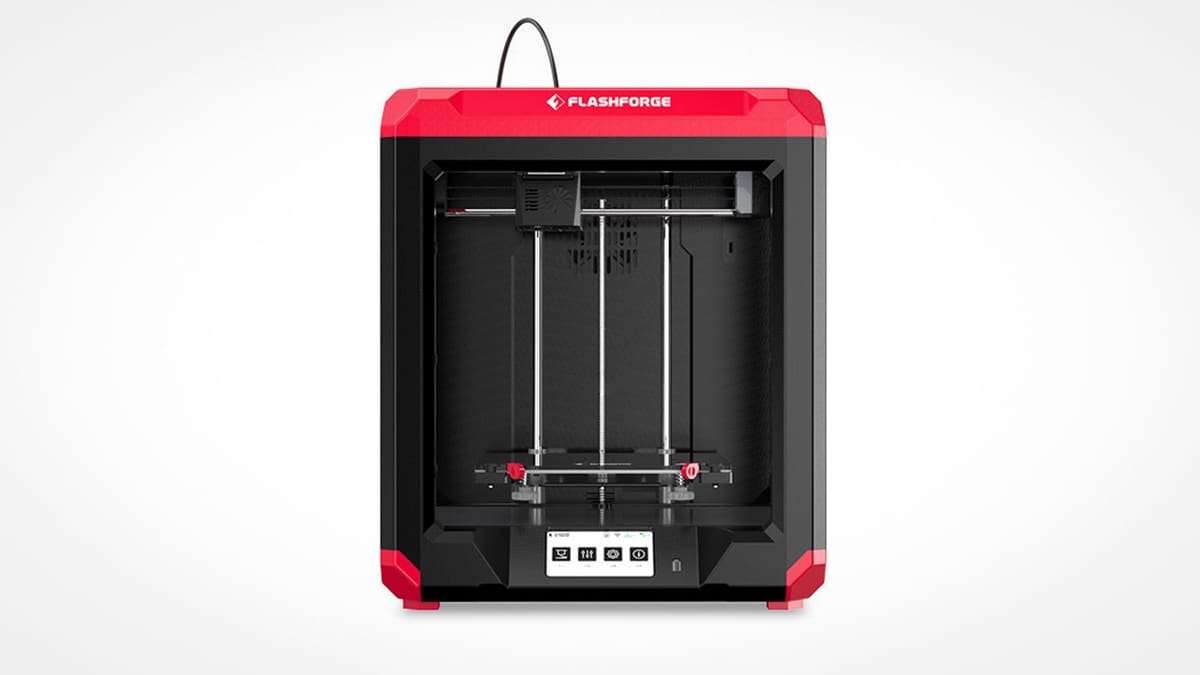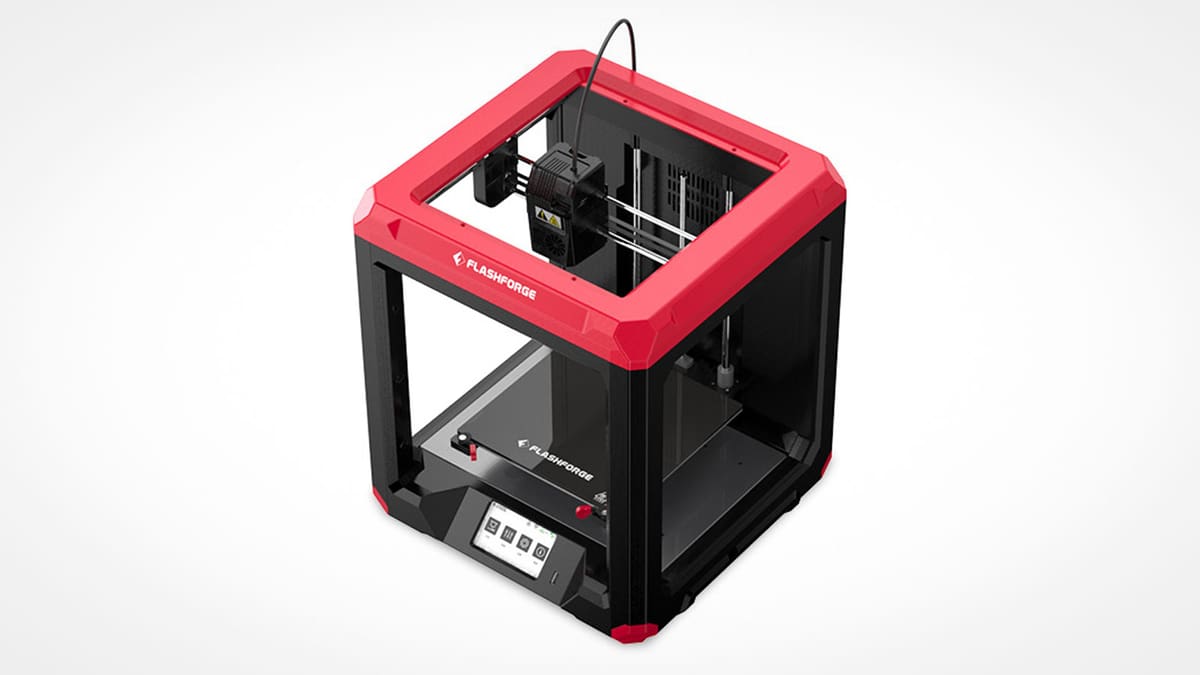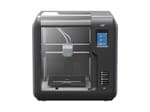The Finder series of 3D printers from Flashforge seems to be gunning for kids and beginners. These 3D printers appear to be specially angled towards education – whether in school, at home, or in any other STEM-friendly environment.
As far as first-use printers go, the new Flashforge Finder 3.0 looks to be a more sophisticated version of its predecessors, as well as being the most elaborate and most expensive Finder so far. It is advertised as being the “first choice for primary and secondary school students”, and features a larger build volume of 190 x 195 x 200 mm, two build plate options (plus a heated bed, at last), and a direct extruder.
The printer’s marketing angle seems to be focused on giving more options to students and beginners, thanks to the increased capacity and a few upgrades, and all of this comes already fully assembled in a ready-to-go design typical of this series.
Come with us as we take a closer look at the Flashforge Finder 3.0’s specs.
Features

Larger build volume
While the original Finder seemed pretty proud of being small, compact and lightweight, the Finder 3.0 apparently finds pride in exactly the opposite.
FlashForge looks to be trying to cater to users with a need or a wish for greater design freedom from the start, or as an upgrade for users who may have used and experimented with old Finder’s, are now ready to move on to bigger prints. To be exact, the increase in build volume goes from the 140 x 140 x 140 mm of the Finder 2.0 to the 190 x 195 x 200 mm of the Finder 3.0, thus gaining in all axes, but most of all in height.
Incidentally, this build volume surpasses the one of the FlashForge Adventurer 3, a cheaper printer with which the Finder 3.0 is often compared.
Direct extruder
The Flashforge Finder 3.0 comes with a direct extruder.
A direct extruder is generally considered a good thing, especially if you’re printing often with flexible filaments such as TPU. However, the extruder should prove useful when using other filaments too, with Flashforge saying PLA, ABS, HIPS, and PETG are all compatible too.
The extruder reaches 260 ℃, which means handling all of the above filaments should be pretty straightforward. Though more exotic filaments such as Nylon and Carbon Fiber are out of reach with the Finder 3.0. Connected to the direct drive extruder is the high heat resistance, that goes to a maximum of 260 degrees. This might appeal to users that print for high-resistant filament such as ABS.
Build plate options
Out of the box, the Finder 3.0 should come with a glass plate already installed. Flashforge has given us some flexibility though, literally, by including a PEI magnetic spring steel sheet, which is removable and flexible. You can pick which one you use according to preference. Beginners and students will be able to experiment with prints produced on each surface, but more experienced users are likely to have a favorite already. Regardless of which surface you prefer, the Finder 3.0 will now be able to heat it up to 110 ℃, which is 110 ℃ more than the previous model.
The plates can be switched via two catches, in what looks like a fairly straightforward operation. You don’t see manufacturers including two different print sheets with their printers from the get-go all that often, so this is a bit of a treat.
Fully assembled
Being fully-assembled isn’t just a characteristic of the Finder 3.0, but of the Finder series overall. It’s worth mentioning that, since the printer explicitly targets beginners, Flashforge would of course take care not to make assembly a long, painful process.
So, no assembly required here. You get an all-in-one design.
4.3-inch touch screen
No big change here, from what we can see, the Flashforge Finder 3.0 has a similar touchscreen to the Finder, albeit one that’s a little bit larger. It’s likely to be intuitive and easy to use, and comes with the following languages pre-installed: Chinese, English, Japanese, French, German and Spanish.
WiFi and internal storage
Like previous versions, the Finder 3.0 has a WiFi connection for remote printing. Not only is this very helpful for those of us who don’t want to constantly get up and plug a USB stick or SD card into a machine, it’s also incredibly useful in educational environments. Teachers and students and normal 3D printing enthusiasts will also likely appreciate the 8 GB of internal storage that comes with the Finder 3.0, a great way to keep all your most important or favorite models in the same place.
Like on the Finder (and any other Flashforge 3D printer) the Finder 3.0 comes with FlashPrint as standard, Flashforge’s own slicing software. It’s basic, but not too complicated to use. If it isn’t up your street, the Flashforge Finder 3.0’s product specifications also list Cura and Simplify 3D as compatible slicers.
Further Features
The Finder 3.0 also provides these little features:
- Assisted leveling: Leveling can be done by following the instructions on the touch screen. All you should have to do is turn some knobs to manually adjust the Z-axis.
- Filament sensor and print recovery: These features are now commonly spotted on nearly all new FDM 3D printers. Prints can be resumed in case of power failure, and filament detection should mean your printer notifies you when filament has run out, and resume printing again once replaced.
- Extruder lamp: A lamp mounted on or near the extruder should help you light up the printing area.

Reviews

As the Finder 3.0 only came out at the very beginning of June 2022, at the time of writing, there are no really reliable reviews for this printer.
The Finder 3.0 can rely on the reputation of its brand a little, as Flashforge has a good if not spectacular reputation and has made very good 3D printers in the past. The Finder 3.0 is certainly not among the cheapest printers to leave its factory gates though.
For the time being, it looks like it may be wise to wait and see what the first reviews come back looking like. Typically, the Finder series has been quite well received, so expect to see solid performances in its reviews.

Price
The Flashforge Finder 3.0 is priced much higher than the Finder, the previous model still offered for sale on Flashforge’s online store. Flashforge’s website shows the Finder 3.0 as having a list price of $599, though at the time of writing, with $100 knocked off for US-based shoppers.
A similar printer from basically the same company under a different brand name, Voxelab, as the Aries, which should offer a very similar experience for around $369.

Tech Specs
General Specifications
- Technology: Fused deposition modeling (FDM)
- Year: 2022
- Assembly: Assembled
- Mechanical arrangement: Cartesian-XZ-head
- Manufacturer: Flashforge
3D Printer Properties
- Build volume: 190 x 195 x 200 mm
- Feeder system: Direct
- Print head: Single nozzle
- Nozzle size: 0.4 mm
- Max. hot end temperature: 260 ℃
- Max. heated bed temperature: 110 ℃
- Print bed material: Glass, PEI
- Frame: Plastic
- Bed leveling: Manual
- Connectivity: WiFi, USB
- Print recovery: Yes
- Filament sensor: Yes
- Camera: No
Materials
- Filament diameter: 1.75 mm
- Third-party filament: Yes
- Filament materials: Consumer materials (PLA, ABS, PETG, Flexibles)
Software
- Recommended slicer: Cura, Simplify3D, FlashPrint
- Operating system: Windows, Mac OSX, Linux
- File types: STL, OBJ, AMF
Dimensions and Weight
- Frame dimensions: 469 x 406 x 416 mm
- Weight: N/A

Similar Printers
Fancy checking out some more great 3D printers? Well then, head on over to our Best 3D Printers Guide, or check out the pair of machines below that are pretty similar to this Flashforge.
Voxelab Aries
For a little less cash, you can get a printer that’s very similar in specification and is made by the same company. Voxelab is a division of Flashforge, and the Aries has WiFi, internal storage, an almost identical build volume, and pretty much the same design. It doesn’t have the direct extruder of the Finder 3.0, but otherwise, it makes a great case for itself as an alternative here.
Monoprice MP Voxel
This machine has a smaller build volume and is older than the Flashforge Finder 3.0, but it still impressed us when we checked it out a couple of years back. It’s now possible to pick one up for under $300, and it’s a fully enclosed machine, meaning it may handle filaments like ABS a bit better. The heated bed only goes to 60 though, which is quite a low number in 2022.
License: The text of "Flashforge Finder 3.0: Specs, Price, Release & Reviews" by All3DP is licensed under a Creative Commons Attribution 4.0 International License.
CERTAIN CONTENT THAT APPEARS ON THIS SITE COMES FROM AMAZON. THIS CONTENT IS PROVIDED ‘AS IS’ AND IS SUBJECT TO CHANGE OR REMOVAL AT ANY TIME.


